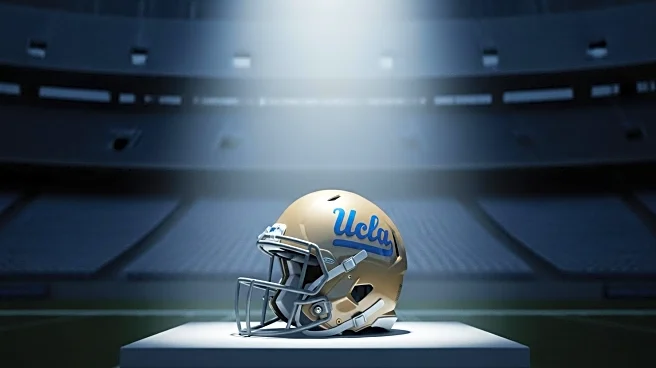What's Happening?
UCLA Bruins football is striving to regain its national relevance after decades of inconsistent performance and leadership changes. The program has not been a major force since the late 1990s, and recent years have seen a carousel of coaches without lasting success. The current focus is on finding a new football coach who can stabilize the program and lead it back to prominence. The search committee, led by athletic director Martin Jarmond, includes top sports executives and alumni. The committee aims to find a leader capable of returning UCLA football to national prominence. Additionally, the program faces challenges such as sparse attendance at the Rose Bowl and lagging support for Name, Image, and Likeness (NIL) deals, which are crucial for recruiting top talent.
Why It's Important?
The significance of UCLA's efforts to regain national prominence in football lies in its potential impact on the college sports landscape. A successful football program can enhance the university's reputation, attract top-tier athletes, and increase revenue through ticket sales and sponsorships. The program's ability to compete effectively in the NIL landscape is crucial, as it influences recruiting and retention of talented players. If UCLA can align its leadership, recruiting power, and fan engagement, it could become a major player in college football once again, challenging rivals like USC and contributing to the competitive dynamics of the sport.
What's Next?
UCLA's next steps involve the selection of a new football coach who can provide stable leadership and drive the program forward. The search committee's decision will be pivotal in shaping the future of UCLA football. Additionally, the program needs to address the issue of sparse attendance at the Rose Bowl and find creative solutions to enhance fan engagement and pride. Efforts to improve NIL support will also be crucial in attracting and retaining top talent. The outcome of these initiatives will determine whether UCLA can successfully navigate the challenges of the Big Ten conference and regain its status as a national football powerhouse.
Beyond the Headlines
Beyond the immediate challenges, UCLA's efforts to regain national prominence in football could have broader implications for college sports. The program's success could influence the competitive balance in the Big Ten conference and impact the recruitment strategies of other universities. Additionally, the focus on NIL deals highlights the evolving landscape of college athletics, where financial incentives play a significant role in shaping team rosters. UCLA's approach to these issues could serve as a model for other programs facing similar challenges.









